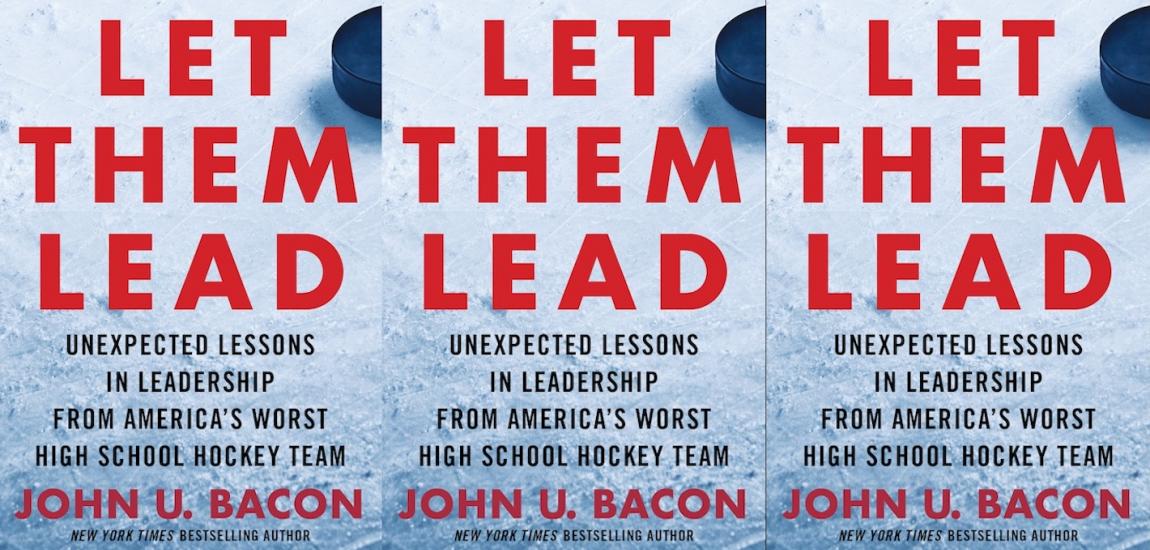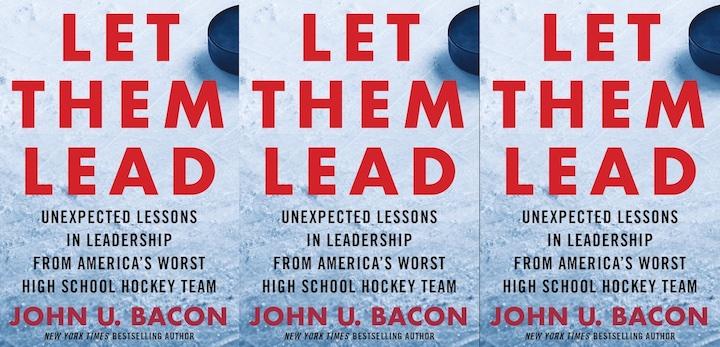John U. Bacon is the author of seven national bestsellers. His latest book -- Let Them Lead: Unexpected Lessons in Leadership from America’s Worst High School Hockey Team -- delivers uplifting lessons drawn from his own coaching experience transforming the nation's worst high school hockey team into one of the best. Here is an excerpt:
Let me tell you a story -- a true story.
In 2000, the ice hockey team at my alma mater, the Ann Arbor Huron High School River Rats (not making that up), finished with a 0-22-3 record.
I had never been a head hockey coach before, and I also happened to hold the record for the most games in a Huron uniform, 86, with the fewest goals: zero.
The combination of a coach who had scored no goals leading a team that had won no games did not portend greatness.
I asked my mentor, Culver Academy's legendary hockey coach, Al Clark -- who retired in 2015 with a U.S. record 1,017 victories -- what I should do. He said: "You need to make it special to play for Huron. And the best way to make it special is to make it hard."
This was the exact opposite of what everyone else had been telling me.
"You need to make them feel like they had to do something hard just to make the team," Clark added, "something not everyone would be willing to do. That way they know just making the team means they accomplished something. And once that culture is established, it is relatively easy to maintain because the players, with a little guidance, will do it for you."
So that's what we did. At our very first summer workout, I told our players, "We are going to be the hardest working high school hockey team in the state. You will be the most important team in school history – the one that saves the program and turns it around. Our goal is nothing less than winning the state title. It won't be this year, but the team that does it will give you a standing ovation at their banquet."
They thought I was crazy – but they kept coming. They were starved for a sense of purpose.
"When we ran around the track, you would yell, 'No one will work harder than we will!'" recalls former player Scooter McConnell, a beloved fourth-line grinder. "You weren't joking. I don't think anyone could have worked harder."
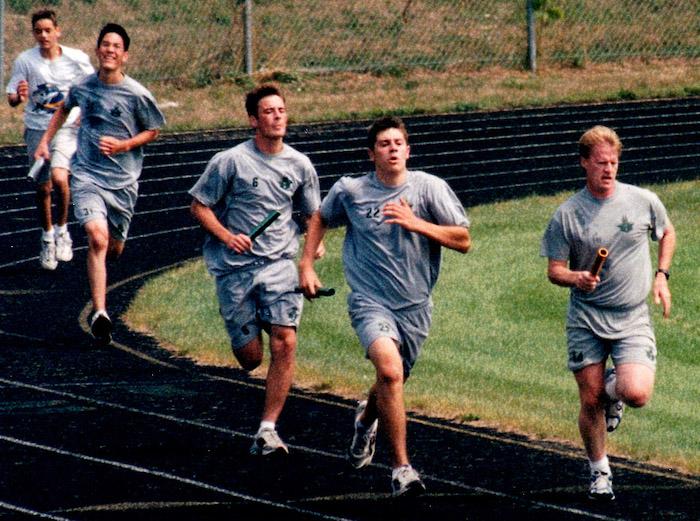
I expected some attrition, but not one player quit.
Thanks to them, the Rats finished 7-17-1 our first year, then notched a 16-9-2 record our second season, with the state's highest grade-point-average, a 3.27. In our third season Huron went 17-4-5, ranked #4 in the state, and #53 in the nation, thereby passing 95-percent of the nation's teams. We didn't cut a single player from the 0-22-3 team, either, most of whom played two or three years more for us.
***
We asked a lot of our players — probably more than any coaches in the state were asking. So why didn't any of our guys quit?
First, because they proved to be much tougher, stronger, and more dedicated than anyone had given them credit for — including me. Second, because we always tried to give them more in return. I came up with a lot of slogans, but I was always interested to see which ones meant the most to them. Those became our mantras. This one they repeated often: "I work hard for you. You work hard for me."
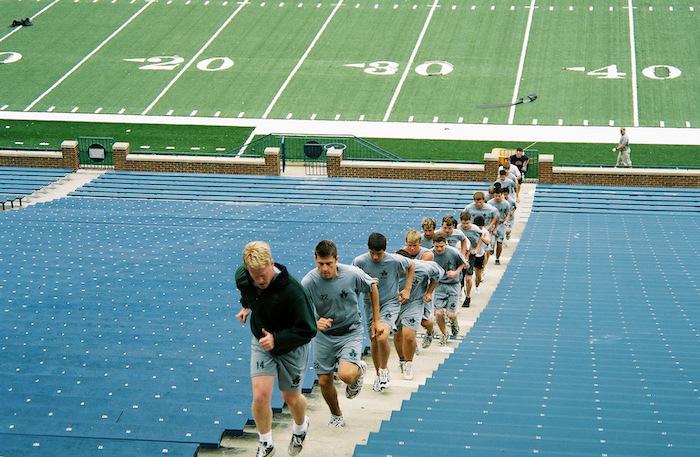
We were undeniably demanding, but we were also generous with praise. I don't know anything that motivates people more than praising them sincerely, in front of their peers — and it's free. Praise is especially important for those who usually don't get to hear it: not your star performers, but the newbies, the bottom-halfers, the unsung heroes. The stars get all kinds of positive feedback from their statistics, their paychecks, the recognition they receive, but it's the ones behind the scenes who need it most.
Because I'd never scored a goal at Huron, I always did my best to make sure that every player on our team scored at least once before they graduated. When they did, we always made a big deal out of it. When someone scored their first goal, one of his teammates would fish the puck out of the net. We never wanted the guy who scored to have to do this. After the game the coaches wrote the details of the goal on the puck with a permanent gold marker, and presented it to the player while his teammates cheered his accomplishment.
Starting in 2000–01, every Huron player scored at least one goal before graduating. But as we neared the end of our second season together, we were in danger of breaking that streak. Every senior had bagged a goal except Scott McConnell, aka "Scooter McGee," the beloved fourth-line grinder quoted above. Scooter looked like a paperboy in a Norman Rockwell painting, possibly the happiest person I've ever coached. He never complained, he always worked hard and supported his teammates, and he was so quick to laugh at just about anything, it became a running joke.
With a half-dozen games left, whenever we were ahead by a few goals I'd put our two All-State forwards, Chris Fragner and Pete Heeringa, on the ice with Scooter, with strict instructions: "You two are not to shoot the puck, or even think of shooting. Just pass, pass, pass to Scooter. Got it?"
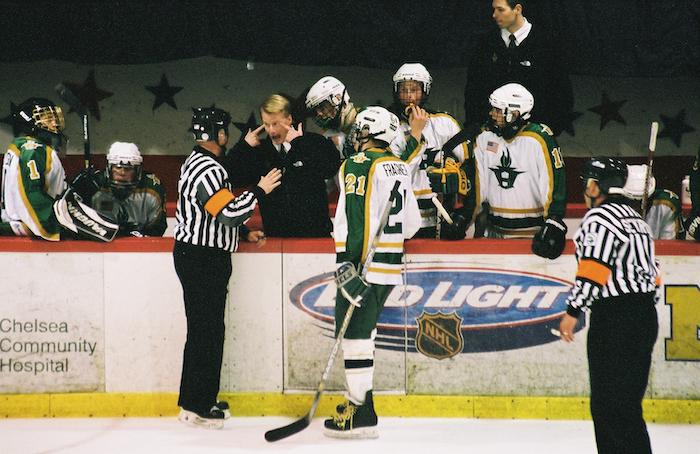
"Got it."
"Good!"
I gave Scooter equally clear instructions: "You are not to check anyone, play defense, or pass. You are to plant your butt in front of their net and shoot when these guys feed you the puck. Just shoot, shoot, shoot. Got it?"
"Got it."
"Good! Now go get yourself a goal."
I certainly can't defend this unorthodox approach as a strategy, but it created the desired result: lots of great chances for Scooter, with the entire team and eventually our fans pulling for him. But after a few weeks he still didn't have a goal to show for it.
"At first, I wanted to score just to get it over with," Scooter recalls, "but as we got down to the last couple games, and I saw how much my teammates were working to get me the puck, it felt like it would be as much an accomplishment for them as for me and I wanted to do my part."
For our last regular-season game, on Senior Night, we played Dexter, a smaller school nearby that had already won nineteen games that year, compared to our thirteen wins. We dressed all ten seniors that night, and our guys dominated Dexter, doing just about everything you could hope for on a Senior Night.
Ahead 5–0 halfway through the third period, we went to our Scooter Plan, putting our two stars on the ice to set him up. But once again, nothing went in. Frags and Hairball returned to the bench with about thirty seconds left, exhausted.
"We did all we could, Coach," Frags said.
"I know you did," I said, tapping them on their helmets.
But while we were talking, Scooter stayed on the ice. When a Dexter player tried to bring the puck up with ten seconds left, Scooter somehow stole the puck and skated toward their net, alone, and whacked the puck. It hit the goalie's stick and bounced right back to Scooter. He whacked it again — and bang! The referee blew his whistle and pointed toward the net. Goal!
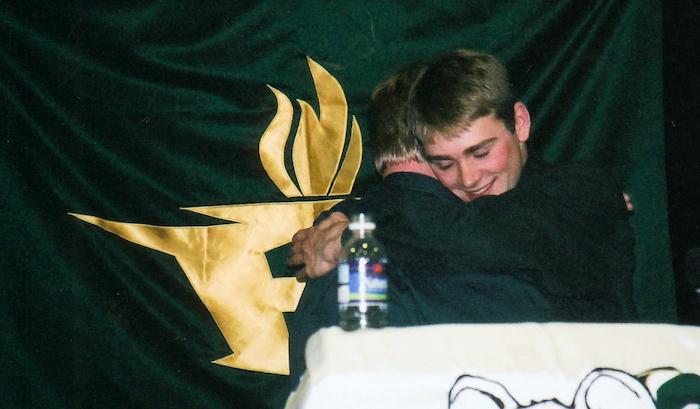
Our guys jumped up and down, hugged and high-fived each other like we'd just won a playoff game in overtime. Our trainer Rod Sorge ran down to give me a hug.
"I didn't know you could jump that high!" he said.
"I didn't either!" I said.
"Scooter's goal was one of my favorites," teammate Jon Eldredge recalls. "He had so many good chances and finally slammed it home. The team erupted on the bench. I mean erupted."
Even the fans, who had been watching us try to set up Scooter for a month, exploded. The scoreboard said: Dexter 0. Huron 6. 00:03.2 seconds left.
He'd done it!
We got the puck, and after we finished shaking hands we took a bunch of photos with the seniors, who formed a circle in the center and kissed the ice — another good sign.
"There weren't a lot of dry eyes among the senior class," says Scooter (pictured on the far left of the front row in the photo below).
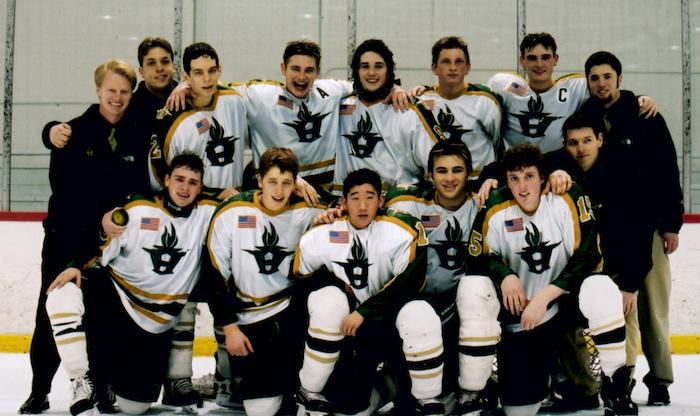
Then we returned to the locker room. We had just won our fourteenth game that year, passing three more teams to become Huron's second-best in thirty-four years. We tore off three sheets. Only the playoffs remained.
Then I said, "Is that it? Oh yes, we have another little bit of business!" The locker room rumbled. They were waiting for it. "A first goal, by none other than Scooter McGee! Come on down, Scooter!"
The same kid who couldn't stop laughing was now the only one crying.
Scooter and I were the last to leave the locker room that night.
***
Our first year captain, Mike Henry, had started a tradition after home games for the parents, and now for friends, classmates, and actual fans too: wait in the lobby at the top of the steps to give each player a standing ovation as he walked up. Some of the guys liked it so much they found an excuse to go back to our locker room downstairs so they could climb up the stairs again.
Scooter and I walked up so much later than everyone else that I assumed the lobby would be empty, but the crowd had been waiting patiently to give Scooter the biggest cheer of all. He smiled and cried and hugged his parents.
More By John U. Bacon: The Great Halifax Explosion: A World War I Story of Treachery, Tragedy, and Extraordinary Heroism
When Scooter and I walked to the parking lot together, I put my arm around him and said, "Scooter, you will never forget this night — and neither will I!"
"Coach, I want you to know: I'm not crying because I scored. I'm crying because it's over."
Scooter went on to earn a law degree and now works in the Department of Homeland Security. I still see him once a year when I'm in DC or he comes back for our annual summer barbeque, or alumni hockey game each winter.
And we were right: we've never forgotten that night.
-- Excerpted by permission from Let Them Lead: Unexpected Lessons in Leadership from America's Worst High School Hockey Team by John U. Bacon. Copyright (c) 2021. Published by Houghton Mifflin Harcourt. All rights reserved. No part of this excerpt may be reproduced or reprinted without permission in writing from the publisher. Available for purchase from Amazon, Barnes & Noble, IndieBound and BAM!. Bacon's previous titles include Overtime: Jim Harbaugh and the Michigan Wolverines at the Crossroads of College Football and Playing Hurt: My Journey from Despair to Hope with the late John Saunders. A collection of his journalism, The Best of Bacon, was released in 2018. Learn more at LetThemLeadByBacon.com, listen to his podcast and follow him on Twitter @johnubacon.

